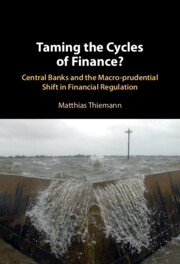Book contents
- Taming the Cycles of Finance?
- Taming the Cycles of Finance?
- Copyright page
- Contents
- Figures
- Tables
- Prologue
- Acknowledgments
- 1 Introduction
- 2 The Changing Regulation of Finance after the Crisis
- 3 The Evolution of Systemic Risk Thinking Pre-crisis
- 4 The Selective Rise of Macro-prudential Ideas in the Wake of the Crisis
- 5 Is Resilience Enough?
- 6 From the Global to the Local
- 7 Taming Liquidity and Leverage in the Shadow Banking Sector
- 8 Into the Upswing
- 9 The Crisis That Wasn’t
- 10 Conclusion
- Appendix: List of Interviews Conducted
- References
- Index
3 - The Evolution of Systemic Risk Thinking Pre-crisis
An Expert Network in the Making
Published online by Cambridge University Press: 15 February 2024
- Taming the Cycles of Finance?
- Taming the Cycles of Finance?
- Copyright page
- Contents
- Figures
- Tables
- Prologue
- Acknowledgments
- 1 Introduction
- 2 The Changing Regulation of Finance after the Crisis
- 3 The Evolution of Systemic Risk Thinking Pre-crisis
- 4 The Selective Rise of Macro-prudential Ideas in the Wake of the Crisis
- 5 Is Resilience Enough?
- 6 From the Global to the Local
- 7 Taming Liquidity and Leverage in the Shadow Banking Sector
- 8 Into the Upswing
- 9 The Crisis That Wasn’t
- 10 Conclusion
- Appendix: List of Interviews Conducted
- References
- Index
Summary
Chapter 3 traces the history of the macro-prudential thought collective before the crisis of 2008. It shows how it was driven by concerns over the deregulation of financial systems in the context of the breakdown of Bretton Woods, and how this community of central bankers was pushed aside by the micro-prudential expert network that crystallized in the Basel Committee for Banking Supervision. It shows how despite the active attempts of the latter to silence these systemic concerns over the increasing integration of capital markets and banking business, this community forged a nascent alliance with academics to systematize and theorize the systemic implications of financial system changes. This expert network then was further empowered by the increasing bouts of financial instability as they occurred from the 1990s onwards, leading to the installation of the Financial Stability Forum in 1999, which became a central locus for the formulation of macro-prudential thought.
- Type
- Chapter
- Information
- Taming the Cycles of Finance?Central Banks and the Macro-prudential Shift in Financial Regulation, pp. 50 - 75Publisher: Cambridge University PressPrint publication year: 2024

